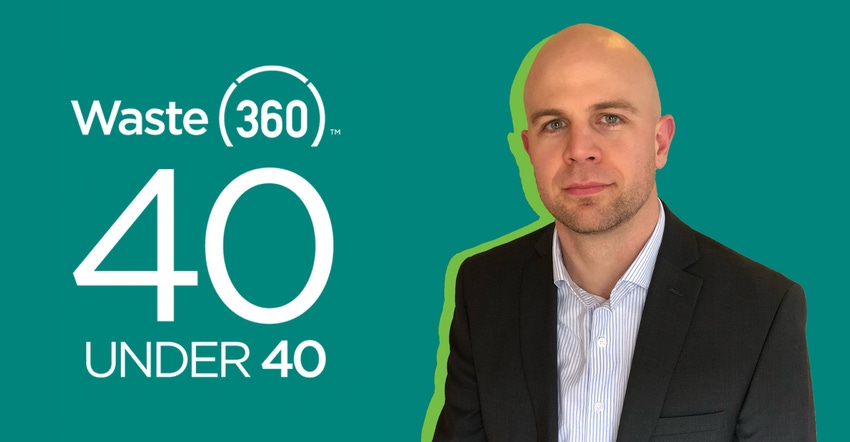
With a career in the waste and recycling industry that began in 2009 as the recycling manager for Montgomery County, Pa., Chris Kaasmann, has grown from his initial role of providing recycling education and technical assistance to the county’s more than 800,000 residents and 62 municipalities.
Now the product stewardship manager for Samsung Electronics America Inc., Kaasmann is responsible for managing the company’s take-back and regulatory requirements for electronic waste, batteries and packaging in the U.S.
This also involves interfacing with state government, recyclers, auditors, industry trade associations, and consumers to ensure 100% compliance, while also helping to shape the way the industry moves forward in proactively and efficiently addressing matters associated with end-of-life electronics, batteries, and packaging.
“As part of my role, I hold positions on the e-Stewards Leadership Council, Washington Materials Management Financing Authority (WMMFA), and Electronics Recycling Representative Organization (ERRO). These roles ensure Samsung leads in driving e-waste policy and programming throughout the U.S.,” says Kaasmann.
As a 2020 Waste360 40 Under 40 Award winner, Kaasmann sat down with us to discuss how he is driving Samsung’s sustainability efforts.
Waste360: How are you managing the environmental impacts of Samsung’s products?
Kaasmann: At Samsung, we are committed to innovating and designing energy-efficient products while minimizing our environmental impact. By incorporating sustainability into our day-to-day business and operations and advancing towards a circular economy, we are not only reducing Samsung’s environmental impact, but also helping consumers reduce theirs.
Waste360: What efforts have you made towards sustainability for Samsung?
Kaasmann: I’ve been involved with initiating a couple of programs since I joined Samsung in April of 2018. The first is the implementation of GPS trackers in scrap electronic devices through the EarthEye program run by the Basel Action Network. This program ensures scrap electronics follow the intended downstream flows as communicated by our network of recyclers. It also gives further assurance to consumers that Samsung is going above and beyond to make sure electronics recycling is done correctly.
Additionally, I was able to work with e-Stewards certified recycler, Wisetek, to implement the first of its kind “Representative Organization” in Washington, D.C. This program expanded electronics collection and convenience to all residents within the District’s eight wards.
Waste360: What goals do you have for Samsung regarding the lifecycle of its products?
Kaasmann: Samsung’s product stewardship mission is to minimize our environmental impact throughout the entire life cycle – from the early stages of product design and material sourcing to use and upcycling (e.g., repair, reuse, take-back and recycling). I’m part of an internal team spearheading a number of projects to help move this vision forward so that Samsung is recognized for its sustainability efforts.
Waste360: What impact have you made on the environment?
Kaasmann: Samsung collects and recycles approximately 100 million pounds of e-waste per year in the U.S. And, in 2019, Samsung achieved our target to collect more than one billion pounds of electronics in the U.S. in total since 2008.
Waste360: What is your leadership style?
Kaasmann: I believe that leaders set the pace by their expectations and example. As such, I prefer to set firm and clear expectations, while providing my colleagues and vendors the trust, time, and environment to get the job done.
Waste360: What professional accomplishment are you most proud of?
Kaasmann: My proudest recognition to date is the 2020 Waste360 40-Under-40 award. I’ve spent the majority of my professional career working to help consumers, the tech industry, and the government make the right decisions regarding their unwanted, leftover, scrap, and waste products. I hope that my actions can inspire others to do more to protect our planet and I’m proud that Samsung allows me to do so and shares my vision for creating a more sustainable future.
Waste360: What are some of the latest initiatives from Samsung?
Kaasmann: Since my focus at Samsung lies in three areas, e-waste, battery, and packaging recycling, I figured I would add some related circular economy-driven goals and initiatives:
E-waste: Globally, through 2018, we collected approximately six billion pounds of electronics and recycled the material. Samsung is now on track to collect and recycle approximately eight billion pounds of electronics globally by the end of this year, and we are aiming to collect and recycle 15 billion pounds of electronics globally by 2030.
Battery: For more than 20 years, Samsung has partnered with Call2Recycle to fund battery recycling throughout the U.S. and Canada. This partnership enables Samsung customers access to 20,000 public collection sites where used batteries can be dropped off for recovery and recycling of battery materials in compliance with state and national regulations.
Packaging: This year, we’ve had some fun with packaging, including the introduction of our new Eco-Packaging in March 2020. It’s a new kind of product packaging that facilitates the upcycling of the boxes that come with our global lifestyle TV models, The Frame, The Serif and The Sero. The special cardboard boxes are designed to reduce waste by providing customers with a way to upcycle and repurpose TV packaging into new household items.
About the Author(s)
You May Also Like


